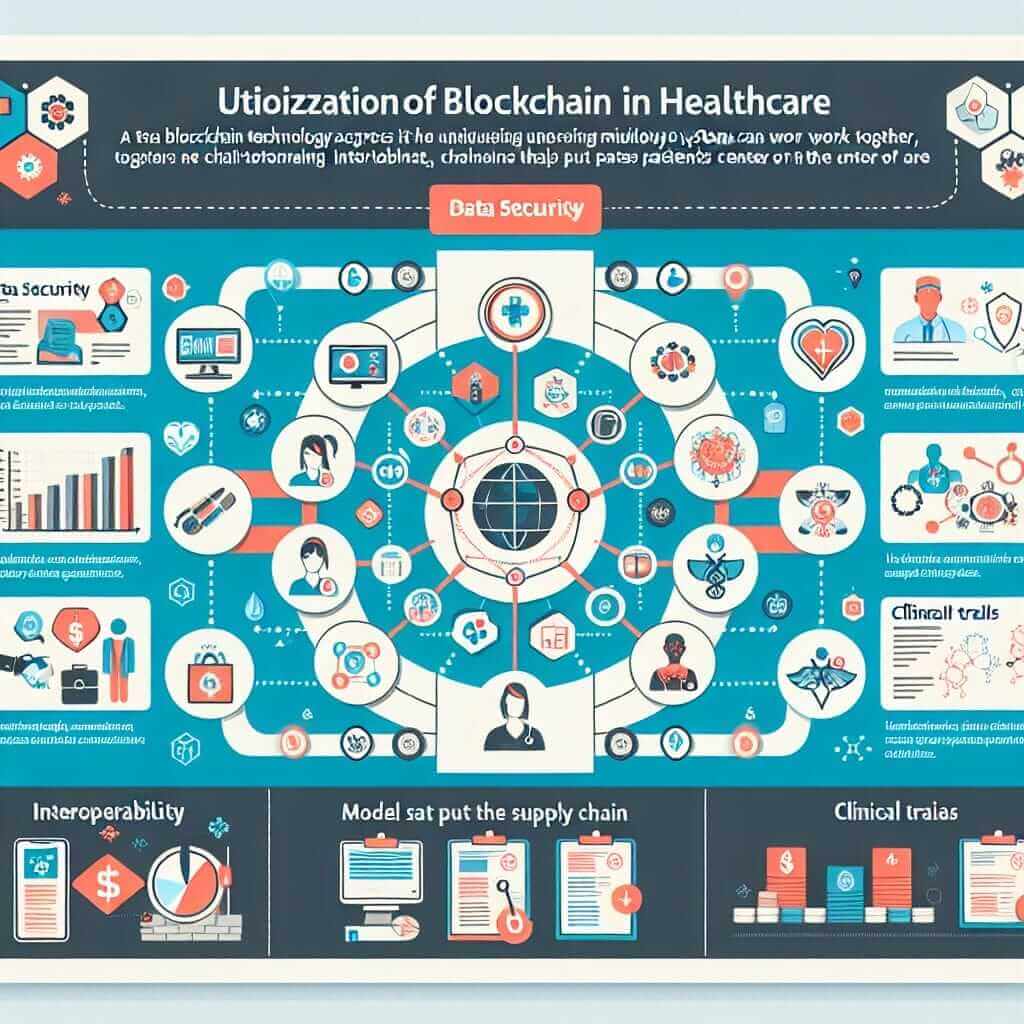The IELTS Reading test is a critical part of the exam, challenging candidates to demonstrate their comprehension skills across a range of topics. In recent years, the advancements in technology have frequently appeared as reading passages in the exam. One such topic is the use of blockchain technology in healthcare delivery. Given its growing importance and prevalence in the industry, it’s a potential subject for future IELTS tests.
This article will explore how blockchain technology is being applied in healthcare and provide a full reading passage, practice questions, answers, and explanations. This comprehensive approach ensures that candidates are well-prepared for tackling this topic in the IELTS Reading test.
Practice Reading Passage
How Blockchain Technology is Revolutionizing Healthcare Delivery
Blockchain technology, the underpinning of cryptocurrencies like Bitcoin, is now finding vital applications in healthcare, promising to enhance data security, streamline processes, and improve patient outcomes. By providing a decentralized and incorruptible digital ledger, blockchain can address many of the industry’s longstanding challenges.
Data Security and Privacy
One of the most significant concerns in healthcare is data security and privacy. Patient records are highly sensitive and often targeted by cyber-attacks. Blockchain’s decentralized nature ensures that data is not stored in a single location. Instead, data is fragmented and stored across multiple nodes, making it virtually impossible for hackers to access the entire dataset. Additionally, blockchain employs advanced cryptographic techniques to secure data, ensuring only authorized access.
Interoperability and Data Sharing
Interoperability between different healthcare systems has been a persistent issue. Different institutions often use varied systems, leading to difficulties in sharing patient data. Blockchain facilitates seamless interoperability by providing a unified, standardized platform. This platform ensures that patient data can be securely and efficiently shared between hospitals, clinics, and other healthcare providers, enhancing continuity of care and reducing medical errors.
Supply Chain Management
Blockchain technology also plays a significant role in enhancing the efficiency of supply chain management in healthcare. The technology’s ability to provide a transparent, immutable record of transactions ensures that every step of the supply chain is meticulously tracked. This transparency helps in preventing counterfeit drugs from entering the market, thus safeguarding patient safety.
Clinical Trials and Research
In clinical trials, ensuring data integrity and transparency is paramount. Blockchain can provide a secure, transparent ledger for recording trial data. This transparency ensures that data cannot be tampered with, thereby maintaining the integrity of the trial results. Researchers and regulatory bodies can access a reliable trail of data, facilitating smoother approval processes and fostering trust in the findings.
Patient-Centered Models
Lastly, blockchain technology empowers patients by giving them control over their healthcare data. Instead of healthcare providers owning the data, patients can decide who has access to their information. This shift towards a patient-centered model promotes autonomy and trust, as patients can ensure that their data is used responsibly.

Blockchain technology holds immense potential to revolutionize healthcare delivery, addressing many critical issues that have long plagued the industry. As the technology continues to evolve, its integration into the healthcare sector is likely to become more profound, paving the way for a more efficient, secure, and patient-centered approach to healthcare.
Practice Questions
Multiple Choice
-
What is one of the primary concerns in healthcare that blockchain technology addresses?
a. The availability of patient data
b. Data security and privacy
c. The cost of healthcare services
d. Access to medical supplies -
How does blockchain facilitate interoperability in healthcare systems?
a. By using a centralized data storage system
b. By providing a unified and standardized platform
c. By reducing the need for data encryption
d. By limiting data access to specific institutions
True/False/Not Given
-
Blockchain technology makes it impossible for hackers to access any data.
a. True
b. False
c. Not Given -
Different healthcare institutions often use the same systems for managing patient data.
a. True
b. False
c. Not Given
Short Answer
-
How does blockchain improve supply chain management in healthcare?
-
In what way does blockchain technology empower patients regarding their healthcare data?
Answer Key
Multiple Choice
- b – Data security and privacy
- b – By providing a unified and standardized platform
True/False/Not Given
- b – False (It makes it virtually impossible but not completely impossible)
- b – False
Short Answer
- Blockchain improves supply chain management by providing a transparent, immutable record of transactions, ensuring that every step of the supply chain is tracked meticulously and preventing counterfeit drugs from entering the market.
- Blockchain technology empowers patients by giving them control over their healthcare data, allowing them to decide who has access to their information.
Common Mistakes
- Misinterpreting the decentralization of blockchain as making data impossible to hack, rather than virtually impossible.
- Confusing standardization for centralization, leading to incorrect answers about interoperability.
Vocabulary
- Decentralized (adj) /ˌdiːsɛntrəˈlaɪzd/: Distributed away from a central authority.
- Interoperability (n) /ˌɪntərˌɒpərəˈbɪlɪti/: The ability of different systems to work together.
- Immutable (adj) /ɪˈmjuːtəbl/: Unchangeable over time.
Grammar Focus
- Relative Clauses: Usage of phrases like “that have long plagued the industry” to add essential information about the subject.
Example: Blockchain technology addresses many critical issues that have long plagued the industry.
Study Tips
- Practice reading about technological advancements and their applications in various fields, as this is a common topic in the IELTS Reading test.
- Focus on understanding the main ideas and implications of the text rather than just details.
- Practice different types of questions to be familiar with the test format and improve your accuracy and speed.
By honing your skills on current, relevant topics like blockchain in healthcare, you can better prepare for the kinds of passages you might encounter in the IELTS Reading test. Keep practicing and stay updated on global advancements to enhance your readiness.